How to Prevent Quiet Quitting [Signs, Causes & 14 Quick Fixes]

Summary:
-
Quiet quitting occurs when employees do only the minimum required for their job, setting clear limits between work and personal time, without going above and beyond.
-
To prevent quiet quitting, regularly acknowledge employee achievements, both publicly and privately, to boost engagement. Employees who feel appreciated are more likely to stay motivated and committed to their work.
-
Encourage employees to take breaks, set clear boundaries, and avoid overloading them with tasks outside of working hours to improve productivity and combat quiet quitting.
-
Employees want to grow in their careers. Offer them training, mentorship, and opportunities for promotion to keep them engaged and prevent burnout.
What if your top performers suddenly stopped going the extra mile? What if the buzz and energy in your office started to fade, replaced by a sense of duty rather than dedication?
This is 'quiet quitting,' a phenomenon where employees mentally and emotionally disengage from their jobs.
Here, we'll explore why quiet quitting happens and, more importantly, what leaders and managers can do to prevent quiet quitting before it starts.
In this article
- Strategies to prevent quiet quitting
- Signs of quiet quitting
- Bad effects of quiet quitting
- Stop employee quiet quitting completely
What is Quiet Quitting
Quiet quitting is when people do just what their job requires - nothing more, nothing less. They don't actually quit their jobs, despite what the name suggests. Instead, they set clear limits between work and their personal time.
Dr. Gena Cox, an organizational psychologist, defines quiet quitting as when an employee decides to intentionally withhold some aspect of their typical job performance.
Quiet quitting means employees won't work extra hours, take on additional tasks, or join activities that aren't required.
Employees basically do the bare minimum and don’t go above and beyond anymore.
Amy Morin, a psychotherapist in the Florida Keys, told Fox Business:
"Quiet quitting refers to the personal decision to quit putting in too much effort at work".
Track productivity patterns to spot changes early
How to Combat Quiet Quitting in the Workplace
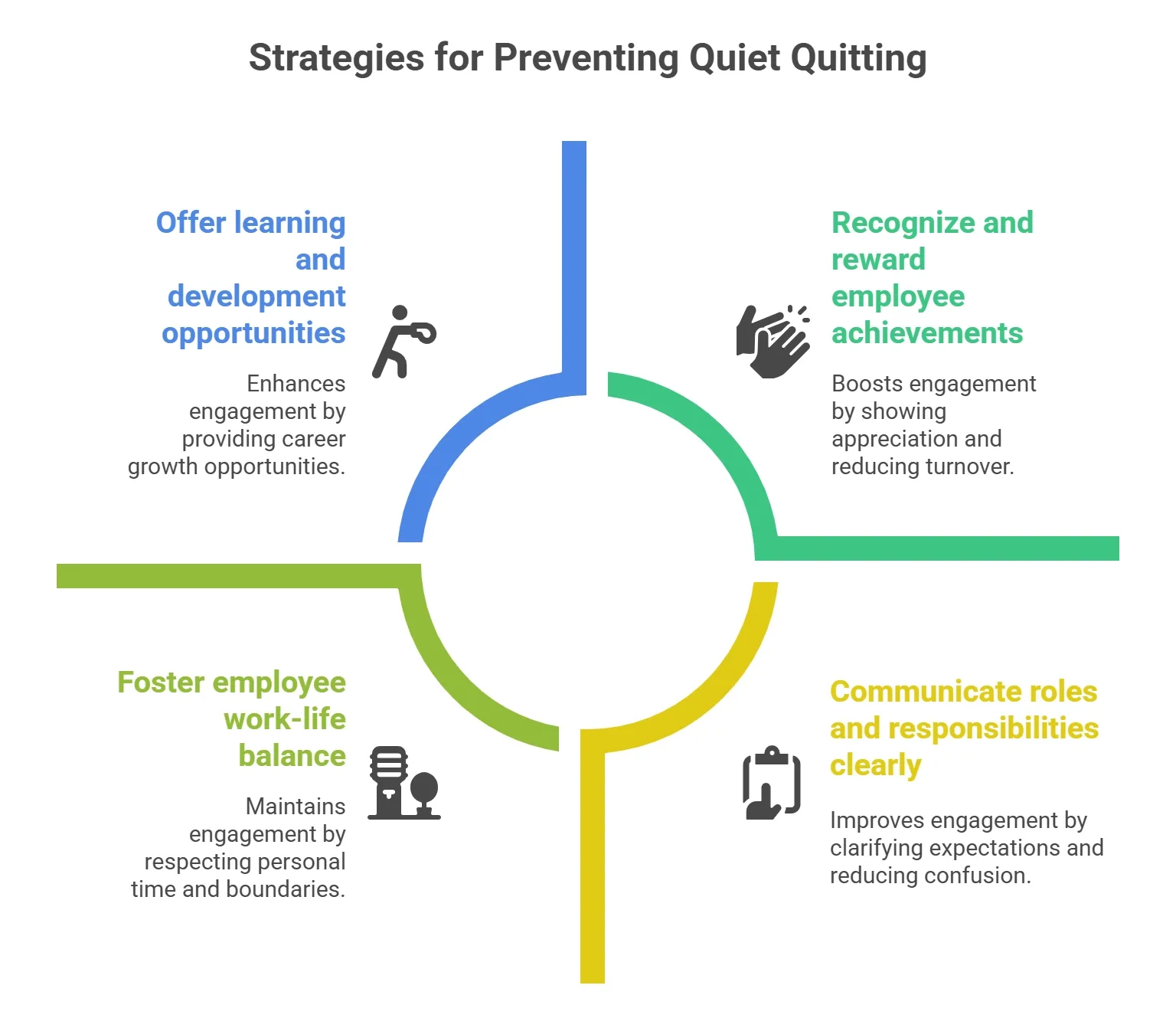
Let’s explore effective approaches to prevent quiet quitting and foster a culture of engagement and commitment within the team.
Recognize and Reward Employee Achievements
66% of employees say they start quiet quitting and think about leaving their job if they don't feel appreciated. [Source: Forbes]
So, regularly acknowledge employees' hard work, both privately and publicly. Use rewards like praise, bonuses, or promotions to show appreciation.
This way, employees are 4X more likely to be engaged when they feel recognized a fair amount for their work.
Additionally, companies with strong recognition programs see 31% lower voluntary turnover and less quiet quitting.
Virtual Employee Recognition Ideas
Monitor team performance to recognize top achievers
Offer Learning and Development Opportunities
According to SurveyMonkey research, career growth is the most important factor for millennials when choosing a job. And 80% say they expect a promotion within the first two years. Otherwise, they start to feel like quiet quitting.
That’s why it is important to provide access to training courses, workshops, or mentorship to help employees develop new skills and grow in their careers.
Foster Employee Work-Life Balance
Workers now prioritize a better work-life balance over salary.
For this reason, encourage employees to take breaks, set clear boundaries for work hours, and avoid overloading them with tasks outside of work hours. This will help you combat quiet quitting.
A study by the Corporate Executive Board found that employees who believe they have a good work-life balance work 21% harder than those who don't.
Provide Regular Opportunities for Feedback
According to Forbes, employees who feel heard are 4.6 times more likely to perform their best work.
So, set up regular one-on-one meetings where employees can share their thoughts on their job and give feedback on their performance, too.
Listen to Employees
85% of employees say effective communication makes them more motivated and connected to their work.
But sadly, only 47% of employees agreed that their employer encourages clear and transparent communication.
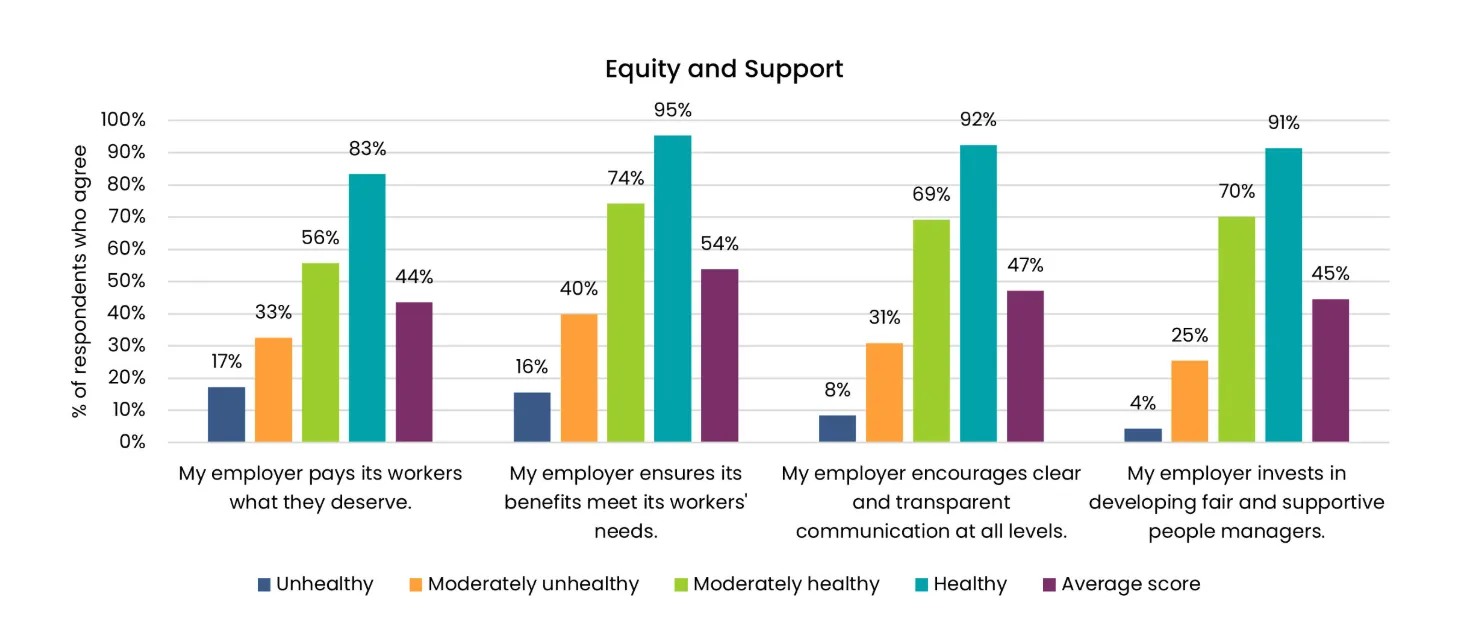
Source: 2024 workplace wellness research
So, you need to create a culture where employees feel comfortable sharing their concerns, ideas, and suggestions. Act on their input to show you value their voice, and they will never think about quiet quitting.
Communicate Roles and Responsibilities Clearly
Only 47% of employees strongly agree they know what’s expected. If workers don’t know their target, how can they reach it?
Therefore, it’s essential to make sure employees understand what’s expected of them, their specific tasks, and how their work contributes to the company’s goals.
Set goals with project tracking features
Give Employees Agency
Allow employees to make decisions in their roles and give them control over how they complete their tasks. Trust their judgment.
In fact, meta-analysis of 259 studies (219,625 participants) shows work design features like autonomy strongly improve satisfaction and reduce strain. [Source: PubMed]
Offer “Future-Proofing” Training
Provide training that prepares employees for future changes, like new technologies or trends, ensuring they feel ready and secure in their roles.
For example, AI has now become a core part in the workplace, and 71% leaders now prefer less-experienced candidates with AI skills over more-experienced ones without them.
Promote “Quiet Thriving”
Psychotherapist Lesley Alderman, who coined the term, describes quiet thriving as putting yourself more in control of your work. You can do it through small, energizing shifts to boost engagement.
Help People Prioritize
68% of workers say they don’t have enough focus time. Meetings and messages create digital debt that crowds out priority work and generates quiet quitting. [Source: Microsoft]
For this reason, help employees focus on what matters most by offering clear guidance on priorities and minimizing office distractions that can lead to burnout.
Eliminate distractions with focused work tracking
Be an Example Yourself
Lead by example. If you want employees to take breaks, set boundaries, or communicate effectively, make sure you do the same.
Provide Proper Compensation
Costco demonstrates the Good Jobs model. It shows approximately 8% turnover compared to a 60% retail average, with higher wages and benefits linked to strong performance. [Source: Harvard Business School]
Ensure employees are paid fairly for their work, with competitive salaries and benefits that reflect their value to the company.
When workers aren't preoccupied with worries about meeting their basic needs, they are more likely to concentrate on their work and deliver higher-quality results.
Maintain Boundaries and Avoid Intrusions during Personal Time
Respect employees' time outside of work. Don’t expect responses after hours, and avoid sending work emails or messages when it’s not urgent.
Offer Mental Health Benefits
According to the World Health Organization (WHO), every year, 1 trillion dollars are lost due to low levels of productivity associated with mental health issues.
However, research in The Lancet Psychiatry has found that every $1 invested in treatment for depression/anxiety yields ~$4 in improved health and productivity.
So, provide access to mental health resources, such as counseling, therapy services, or stress management workshops, and encourage employees to use them.
Why are Employees Quiet Quitting?
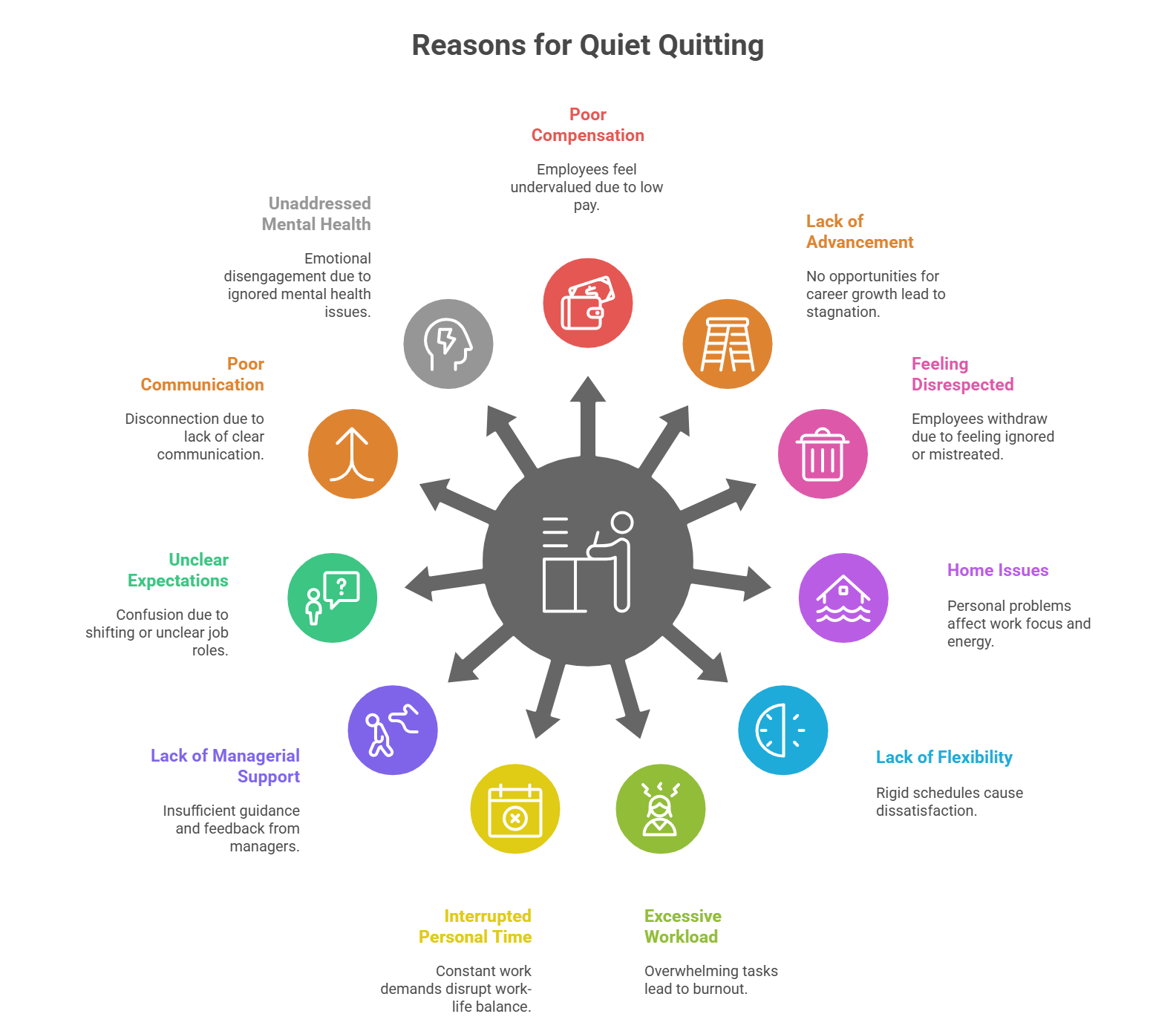
Understanding why employees quietly quit is the first step in addressing the issue and taking proactive measures to prevent it.
Poor Compensation
Research from Payscale shows that pay is one of the biggest reasons someone might quiet quit. If they aren't being rewarded for extra effort, what's the motivation to go above and beyond?
In fact, according to a Pew Research survey, 63% of workers who quit their jobs chose low pay as a primary reason, and 51% of quiet quitters name compensation as a primary influence on their work ethic.
No Opportunity for Advancement
Employees want to grow in their careers. If there are no clear paths for promotion or development, they can feel stuck and disengaged.
Without the possibility of moving up or taking on new challenges, they might lose interest in their roles.
For example, Maggie Perkins, a teacher, started quiet quitting at her job, even before it became a TikTok trend. She said to CNBC,
"There was no reason for me to hustle because, as a teacher, there are no promotion opportunities. If you're the person who wins the award for teacher of the year, you'll make the same salary as somebody who isn't".
Feeling Disrespected
If employees feel ignored, undervalued, or mistreated by managers or coworkers, they may start withdrawing. Over time, this can lead to them disengaging from their work entirely.
Issues at Home
Personal problems like family concerns or financial stress can spill over into the workplace. If employees are dealing with heavy personal issues, their focus and energy at work may decline. This leads to a lower level of effort or interest in going above what’s required.
Working from Home with Kids
Lack of Flexibility or Choice
A rigid work schedule or environment where employees don’t have the freedom to balance personal and work life can create dissatisfaction.
Flexibility, like remote work or adjusted hours, can significantly boost morale. Without it, employees might just do what they must to get by.
For instance, 45% point to a lack of flexibility to choose when they put in their hours as a reason for quiet quitting. And 81% of employees considered a flexible work schedule to be important and valuable.
Enable flexible scheduling with smart work tracking
Excessive Workload
In a study of Greek nurses, 74.3% belonged to the group of quiet quitters, with higher workloads associated with higher levels of quiet quitting.
When employees are overloaded with tasks and responsibilities, they may feel overwhelmed and burned out. If this continues without relief, they may reduce their effort to the bare minimum to avoid stress and exhaustion.
Workload Management
Interrupted Personal Time
If employees are constantly asked to stay late or work during their personal time, they can feel like they have no control over their own lives. This frustration can lead them to disengage from work, only doing what's necessary to maintain their job.
In the Philippines, 67% of employees cited less stress, and 54% cited better mental health as the benefit of quiet quitting. Nearly half (48%) of employees in the Philippines value the work-life balance that comes with quiet quitting. [Source: Philstar Global]
Lack of Managerial Support
Managers play a key role in motivating and supporting their teams. If employees feel they don’t have proper guidance, feedback, or encouragement from their managers, they can feel disconnected from their work and become less engaged.
The majority of quiet quitters said their manager affects their work ethic (57%).
Harvard Business Review research indicates that quiet quitting is usually less about an employee's willingness to work harder and more creatively, and more about a manager's ability to build a relationship with their employees.
Support managers with team insights and data
Shifting or Unclear Expectations
If employees aren’t sure what’s expected of them, or if their job responsibilities change frequently without clear communication, it can create confusion and frustration. This uncertainty can lead to disengagement, as employees feel they are not being set up for success.
Gallup research shows that the overall decline in engagement was especially related to clarity of expectations, opportunities to learn and grow, feeling cared about, and a connection to the organization's mission or purpose.
Poor Communication Issues
Clear communication is key to a productive workplace.
But if employees are left in the dark about company goals, team progress, or expectations, they may feel disconnected from the organization.
Mental Health Concerns Go Unaddressed
If employees are struggling with mental health issues, such as stress or anxiety, and feel they don’t have the support they need, their engagement and performance at work can decline.
When mental health concerns are not acknowledged or addressed, employees may simply "check out" emotionally from their roles.
In fact, 55% of quiet quitters cite mental health as affecting their work ethic.
What are the Signs of Quiet Quitting
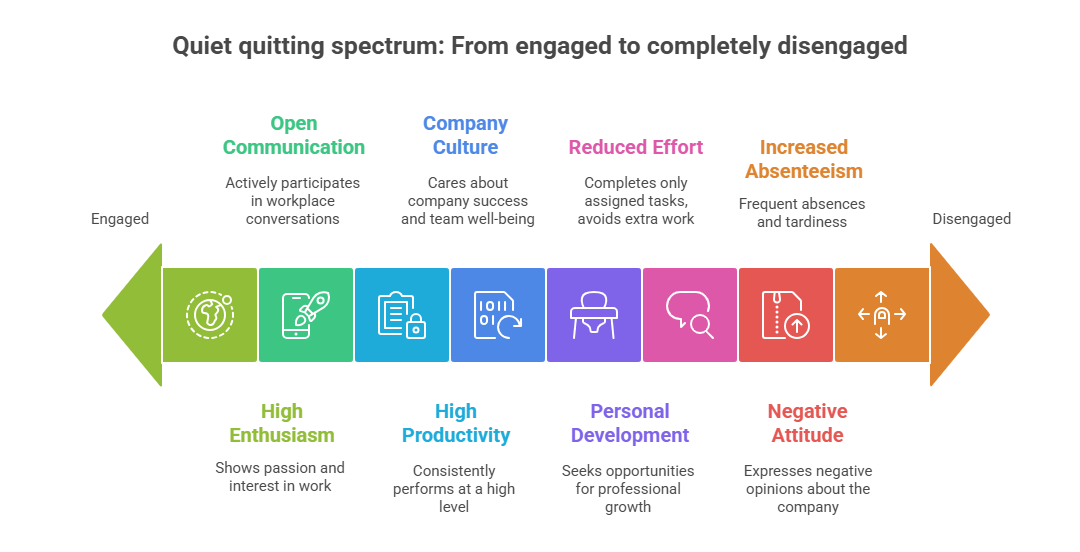
Here are some common signs of quiet quitting:
Reduced Effort
Employees who are quiet quitting will put in the bare minimum effort. This includes completing only the tasks assigned, without taking on additional work, avoiding overtime, or showing little initiative in going beyond the basic requirements of their role.
Spot employee behavior changes with activity tracking
Lack of Enthusiasm
A noticeable decline in enthusiasm can be a key sign. Quiet quitters often show little passion or interest in their work, and they might avoid engaging in discussions about projects or the company's future.
Career expert Maggie Perkins, who documented her own quiet quitting experience, noted:
"Quiet quitting removes any emotional investment you might have from your work, which is sad given the fact that most of us spend so much of our time at work."
Minimal Communication
Quiet quitters stop engaging in workplace conversations beyond what is necessary. This could mean not participating in meetings, avoiding socializing with colleagues, or not contributing to team discussions. They may also stop providing feedback or voicing concerns.
Decreased Productivity
Productivity drops because the employee is no longer motivated to perform at their previous level. They still complete their work, but the speed and quality of the output decline over time.
Monitor employee productivity with detailed reports
Avoidance of Extra Tasks
Quiet quitters continue to fulfill their primary responsibilities, but they're less willing to engage in activities known as citizenship behaviors. This means no more staying late, showing up early, or attending non-mandatory meetings.
Anthony C. Klotz, Professor of Organizational Behavior at UCL School of Management, describes this as employees becoming "less psychologically invested in work" while still meeting basic job requirements. [Source: Harvard Business Review]
Disengagement from Company Culture
Dissatisfied quiet quitters do not care as much about company success and may isolate themselves to only core tasks and events. They don’t care about whether their team or company does well.
In the UK, a staggering 90% of employees are feeling detached from their roles, according to Gallup's 2024 research.
Increased Absenteeism or Tardiness
Frequent absences, tardiness, or leaving early could signal that an employee is disengaged. While these behaviors are not exclusive to quiet quitting, they often indicate that someone is no longer invested in their role or company.
Negative Attitude or Cynicism
A quiet quitter expresses negative opinions or shows cynicism about the company, leadership, or work processes. Their attitude shifts from constructive feedback to outright dissatisfaction.
The telltale signs include lacking motivation and enthusiasm for work, feeling useless, or even angry and irritable, according to Martin Poduška, career writer for Kickresume.
No Personal Development
Employees who are quietly quitting will often stop seeking opportunities for professional growth. They may stop attending training sessions, seeking promotions, or working toward career advancement. They no longer have any goals within the company.
What are the Negative Effects of Quiet Quitting
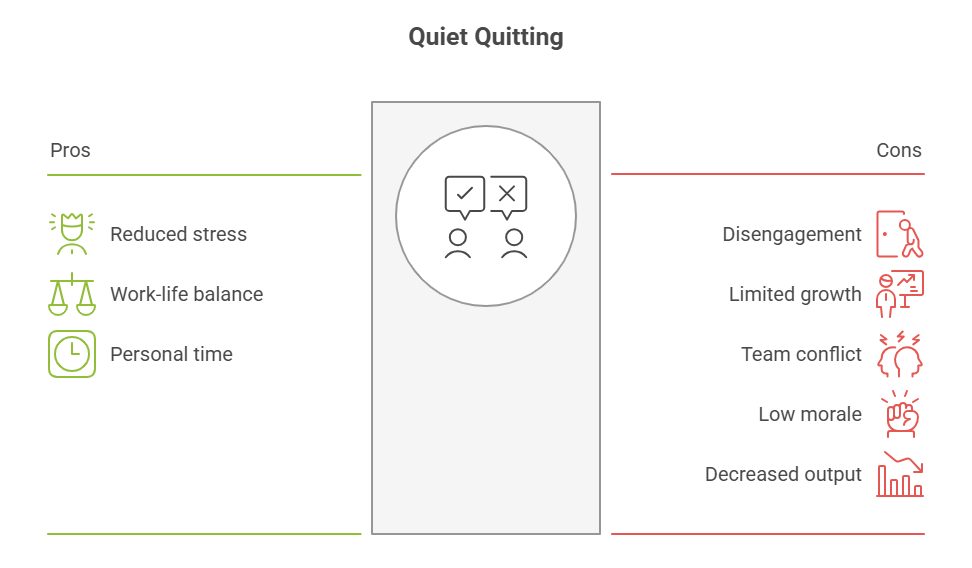
Here’s what happens when employees start quiet quitting:
Disengagement and Dissatisfaction
Research published in PMC shows that in the case of quiet quitting, employees remain at their jobs but are frustrated, have lost their passion for their job, and try to work as little as possible.
Limited Career Growth
When someone only does the basics, they miss out on opportunities to learn new skills or take on challenges. This slows down their career progression and reduces chances for promotions.
Possible Team Conflict
Michael Timmes, a senior specialist at Insperity, said to CNBC,
"From an office perspective, quiet quitting can cause conflicts between employees, as some employees will feel others aren't carrying their weight".
According to 33% of HR professionals, workers quietly quitting also increases gossip, drama, and blame.
Low Workplace Morale
When quiet quitting happens, it affects the overall energy and attitude at work. Other employees might feel demotivated or discouraged. This leads to a negative work environment.
Motivating Employees Who Work Remotely
Decreased Output
With less effort being put into the job, the overall productivity and quality of work can drop, which affects the success of the company or team.
Employee disengagement costs the global economy $8.8 trillion in lost productivity annually. [Source: Gallup]
Prevent productivity loss with engagement tracking
Prevent Quiet Quitting with Apploye
Preventing quiet quitting requires more than good intentions; it demands actionable data.
For that, Apploye can help you spot early warning signs through user activity monitoring. It ensures fair workload distribution with project tracking and recognizes top performers.
The key is using technology to support employees, not surveil them.
When you combine employee monitoring insights with meaningful conversations about growth and recognition, you create an environment where employees choose engagement over quiet quitting.
Ready to build a more engaged workforce?
Frequently Asked Questions about Quiet Quitting
How to stop being a quiet quitter?
If you want to stop quiet quitting, start by doing more than just the basics at work. Talk to your boss about what you need and what's bothering you. Get involved with your coworkers again and volunteer for projects that interest you. Figure out why you checked out in the first place. Maybe you're burned out or feel unappreciated - then address those issues directly.
How does employee burnout cause quiet quitting?
When employees get burned out from too much stress and work, they don't quit their jobs - they just stop caring. They do the bare minimum to get by and refuse to take on extra tasks. It's basically their way of protecting themselves without losing their paycheck. They're still there physically, but mentally they've already checked out.
How to handle employee quiet quitting?
When employees start doing just the bare minimum at work, it's usually a sign that something's bothering them. Have a friendly chat to figure out what's going on. Maybe they're burned out, feel unappreciated, or don't know what you expect from them. Try giving them clearer goals, some recognition for good work, and chances to grow. Make sure their workload isn't crazy either. If they still won't engage after you've tried helping, then you might need to have a more serious performance conversation.
What is the root cause of quiet quitting?
Quiet quitting happens when people stop going above and beyond at work. This is because they feel undervalued. When employees don't get recognition, fair pay, or chances to grow, they start doing just the bare minimum. Poor managers and toxic work environments make it worse. People naturally match their effort to how much they feel the company actually cares about them.
Has the concept of "quiet quitting" or doing the bare minimum at work become the norm in workplaces?
Yes, quiet quitting is pretty common now. About half of US workers are doing it. Around 62% of workers globally aren't really engaged. This is costing companies hundreds of billions annually.
Why is Gen Z quiet quitting?
Gen Z is quiet quitting because they watched their parents how hard they worked for companies that didn't care about them. They saw how the "go above and beyond" mentality didn't lead to better pay, job security, or respect. So now they're doing exactly what they're paid for; no more, no less. They want work-life balance and fair treatment, and if employers won't give that, Gen Z won't give extra effort.
What is ghost quitting?
Ghost quitting is when someone stays at their job but basically stops caring. They show up to work but only do the absolute minimum. They won't take on extra tasks, share ideas, or put in real effort anymore. It's like they've mentally quit but haven't actually left yet.
How can we support and engage younger workers to end "quiet quitting"?
To keep younger workers from "quiet quitting," you need to show them they're valued. Give them clear goals and regular feedback. Offer them chances to learn new skills and move up in the company. Also, create a supportive workplace that respects their personal time and well-being. When you invest in them, they'll invest in you.
How can companies improve employee engagement and prevent both "loud quitting" and "quiet quitting"?
To prevent them from "loud quitting" or "quiet quitting", focus on building a culture where people feel seen and valued. Give them a clear path for growth and make sure they're paid fairly. Provide regular, helpful feedback so they know where they stand. When you show you care about their career and well-being, they'll be more engaged and committed to your company.

